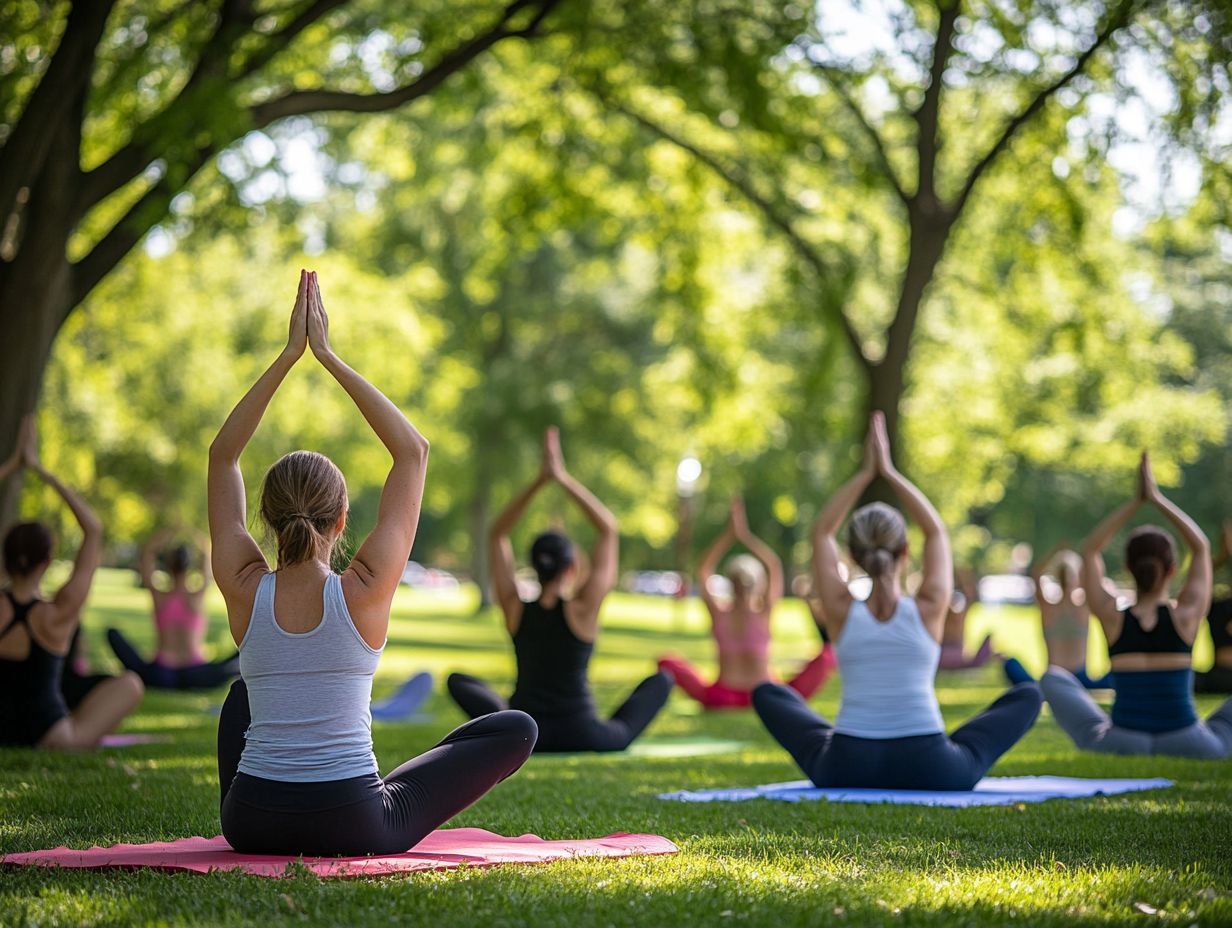Can Mind-Body Practices Enhance Physical Health?
In a time when the mind and body are often viewed as separate, mind-body practices are gaining recognition for their positive impact on physical health.
Let s explore exciting techniques like yoga, meditation, and tai chi that promote relaxation and provide real benefits for your well-being.
You ll learn the science behind these practices, see how they can complement traditional medicine, and gather practical tips to integrate them into your life.
Discover how nurturing the connection between your mind and body can lead you to a healthier, balanced life.
Contents
- Key Takeaways:
- Mind-Body Practices: An Overview
- Physical Health Benefits of Mind-Body Practices
- Specific Mind-Body Practices for Physical Health
- Combining Mind-Body Practices with Traditional Medicine
- Tips for Incorporating Mind-Body Practices into Daily Life
- Frequently Asked Questions
- 1. Can mind-body practices really enhance physical health?
- 2. What are some examples of mind-body practices?
- 3. How do mind-body practices improve physical health?
- 4. Can mind-body practices help with chronic pain?
- 5. Can anyone practice mind-body techniques?
- 6. Are there any potential risks or side effects of practicing mind-body techniques?
Key Takeaways:

Mind-body practices like yoga and meditation positively impact physical health.
Research shows a strong link between the mind and body, influencing each other.
Incorporating these practices into your daily life can enhance traditional treatments and improve your overall well-being.
Mind-Body Practices: An Overview
Mind-body practices include techniques aimed at enhancing the connection between your physical and emotional health.
Practices like meditation and yoga help manage stress and improve how you handle emotions.
Research shows that adding mind-body therapies to your routine can significantly reduce chronic pain and anxiety, contributing to better community health.
Explanation and Examples of Mind-Body Practices
Mind-body practices, including meditation, yoga, and tai chi, promote harmony between your mind and body.
Mindfulness meditation focuses on the present moment, helping you build emotional strength.
Yoga combines physical postures with breath control to develop strength and clarity.
Tai chi’s graceful movements improve balance and promote mental calmness.
Each practice activates a relaxation state, marked by a slower heart rate and reduced muscle tension, making them effective in schools and healthcare settings.
Incorporating these practices creates a supportive environment for both students and patients.
Physical Health Benefits of Mind-Body Practices
The benefits of mind-body practices are well-documented, showing improvements in well-being and stress management.
Regular activities like yoga and meditation can enhance cardiovascular health and reduce chronic pain.
Research on the Connection Between Mind and Body
Research confirms a strong link between mind and body, showing how engaging in these practices affects both mental and physical health.
Studies from institutions like Massachusetts General Hospital highlight how regular mindfulness can boost telomerase activity, affecting cellular aging and health.
Understanding these biological mechanisms reveals how stress reduction and improved mental well-being lead to better health outcomes.
Specific Mind-Body Practices for Physical Health

Engaging in specific mind-body practices like yoga, meditation, and tai chi not only enhances your physical health but also highlights the benefits of mind-body practices for stress relief.
Each practice uniquely reduces stress and promotes well-being, helping you cultivate a balanced and harmonious life.
Yoga
Yoga beautifully blends physical activity with mindfulness. This combination triggers relaxation, enhances emotional regulation, and alleviates chronic pain.
Exploring different styles like Hatha, Vinyasa, and Iyengar lets you find an approach that suits your needs. Hatha is ideal for beginners, emphasizing foundational postures and breath control for better flexibility.
Vinyasa introduces dynamic movements synchronized with breath, promoting strength and endurance. Research shows yoga enhances mental clarity, significantly reducing anxiety and stress levels.
Incorporating these practices into your daily routine nurtures your physical health and cultivates inner peace.
Meditation
Meditation, especially mindfulness meditation, helps you become more aware and promotes relaxation. This practice boosts your ability to cope with stress.
It encourages a deep connection with the present moment and nurtures a non-judgmental attitude towards your thoughts and feelings.
Techniques like guided imagery, loving-kindness meditation, and body scans enrich your experience, deepening relaxation and emotional regulation.
Research shows these methods alleviate anxiety and bolster emotional resilience. Regular meditation can lower cortisol levels, promoting mental clarity and emotional balance.
By incorporating these techniques into your daily routine, you ll find a powerful path to enhanced mental wellness.
Tai Chi
Tai Chi is a gentle form of physical activity characterized by slow, deliberate movements. It offers numerous health benefits and effectively manages stress.
Originally developed as a martial art in China, Tai Chi embodies balance and harmony. Rooted in traditional Chinese medicine, it promotes the flow of vital energy throughout your body.
This practice is inclusive; individuals of all ages can tailor movements to fit their capabilities and enjoy its calming effects.
Numerous studies highlight that engaging in Tai Chi significantly reduces anxiety and enhances overall physical health, making it a valuable tool for cultivating wellness and resilience.
Combining Mind-Body Practices with Traditional Medicine
The integration of mind-body practices with traditional medicine offers a holistic approach to patient care.
By emphasizing both physical and emotional health, you improve overall outcomes, ensuring a more comprehensive and fulfilling healing journey.
How Mind-Body Practices Can Complement Traditional Treatments

Mind-body therapies powerfully complement traditional treatments, enhancing health outcomes and elevating patient care.
Consider practices like yoga and meditation, increasingly woven into treatment plans for chronic pain and anxiety. Engaging in regular mindfulness sessions with prescribed medications can lead to remarkable reductions in pain levels and anxiety.
In cancer care, guided imagery techniques help manage chemotherapy side effects and foster positive transformations in emotional and physical well-being.
This holistic approach empowers patients, as seen in testimonials praising the invaluable support these integrative methods provide.
Tips for Incorporating Mind-Body Practices into Daily Life
Incorporating mind-body practices into your daily routine can profoundly enhance your well-being. These activities support your mental and physical health.
Practical Ways to Implement Mind-Body Practices
There are many ways to embrace mindfulness and physical activity. Schedule these activities to make them a fun part of your day.
Joining wellness groups can give you motivation and accountability. Share experiences and celebrate your successes with others.
Use meditation apps or fitness trackers for personalized insights and reminders. This will help you stay consistent with your practices.
Over time, these strategies will create a sense of peace and balance while boosting your long-term health.
Frequently Asked Questions
1. Can mind-body practices really enhance physical health?
Yes, numerous studies show that incorporating mind-body practices into your routine can positively impact your physical health.
2. What are some examples of mind-body practices?

Mind-body practices include yoga, meditation, tai chi, qigong, and mindfulness. These activities connect your mind and body.
3. How do mind-body practices improve physical health?
These practices can reduce stress and promote relaxation. This helps lower blood pressure and improve immune function.
4. Can mind-body practices help with chronic pain?
Yes, studies have shown they can effectively manage chronic pain. They alleviate tension and promote a sense of calm.
5. Can anyone practice mind-body techniques?
Yes, these practices are suitable for all ages and fitness levels. They can be modified to fit individual needs.
6. Are there any potential risks or side effects of practicing mind-body techniques?
In general, mind-body practices are safe with minimal risks. However, consult a healthcare professional before starting any new routine.






